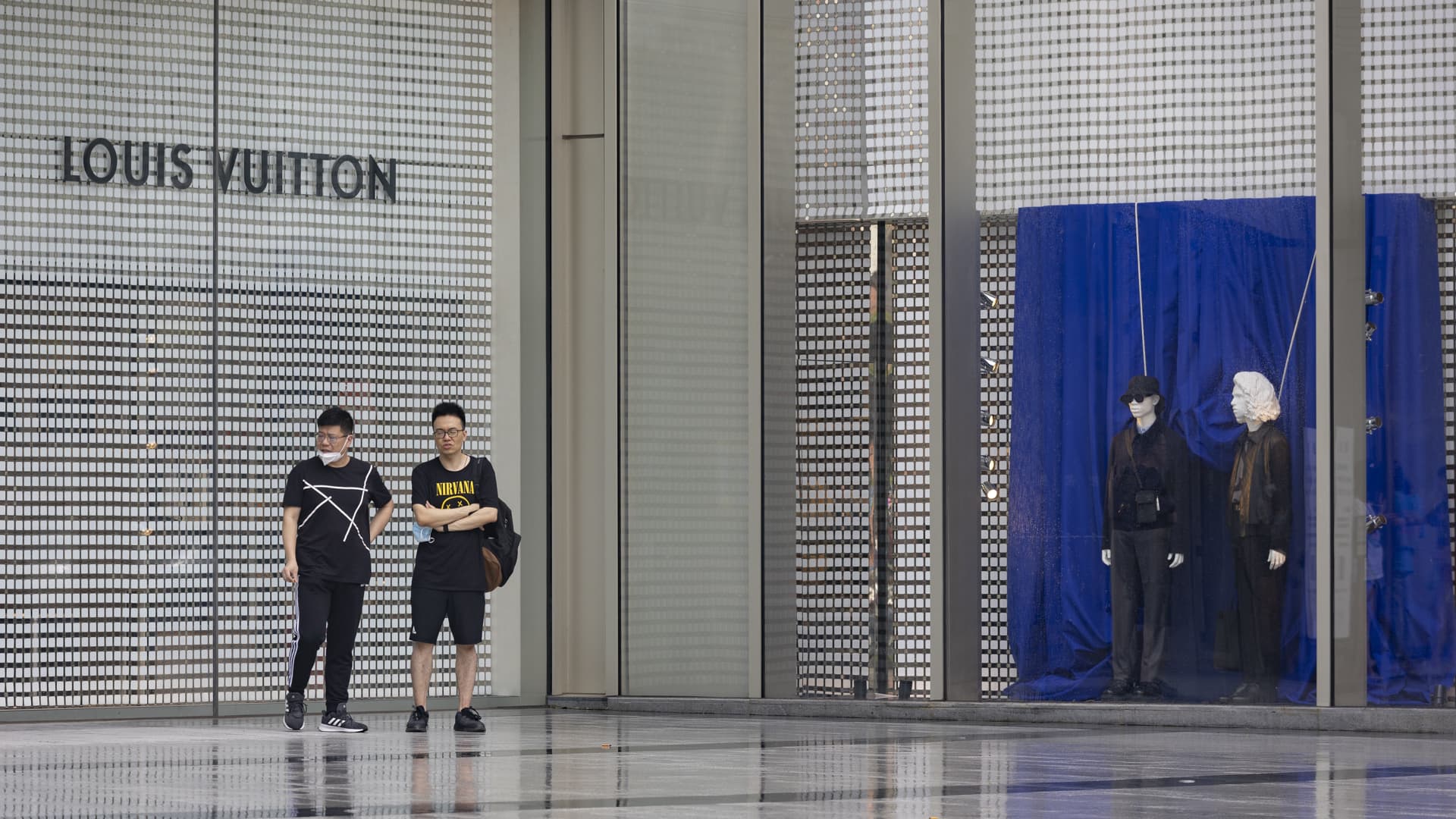Products You May Like
BEIJING — Luxury brands have slashed expectations for their China business this year after the country’s latest Covid lockdowns, according to an Oliver Wyman survey shared exclusively with CNBC.
Forecasted growth for luxury and premium consumer brands was cut by 15 percentage points, and down nearly 25 percentage points for luxury brands alone, according to survey results released Wednesday.
Premium and luxury goods businesses now expect only 3% year-on-year growth in their mainland China business this year, down sharply from an 18% surge they forecast a few months ago, the report said. That’s based on a weighted average of the survey results.
Oliver Wyman said its survey of executives in May covered more than 30 of the consulting firm’s clients across premium consumer and luxury goods, representing more than $50 billion in retail sales.
Uncertain future
Shanghai, the city with the largest gross domestic product in China and a hub for foreign business, faced the brunt of China’s Covid outbreak this spring — the country’s worst since the initial shock of the pandemic in early 2020. The city ordered people to stay home and most businesses to shut for two months, before attempting to reopen on June 1.
“There is still a very high uncertainty of what will be the future Covid [measures] in China,” Kenneth Chow, principal at Oliver Wyman, said in a phone interview this week.
“There is a huge doubt about whether the consumer confidence [can] recover quickly, as in 2020 and 2021,” he said, citing the firm’s interviews with executives.
China’s retail sales plunged by 11.1% in April from a year ago, following a 3.3% increase during the first three months of the year. Consumer spending in China never fully recovered from the initial phase of the pandemic, and as Covid drags into its third year, people are increasingly worried about future income.
The unemployment rate in China’s 31 largest cities surpassed 2020 highs to reach 6.7% in April — the highest since records began in 2018.
“It seems that this time around, the affluent Gen Z [age 25 or younger] may react differently, especially since a lack of job security may be something that they have to deal with for the very first time,” the report said. “Another common view from our interviewees is that the longer the restrictions, the longer the upcoming U-trough will last.”
Even in areas not locked down, client anecdotes said in-store traffic fell by more than 50%, and the percentage of those visitors actually making a purchase was up to 30% lower, according to the Oliver Wyman report.
China has maintained a strict “dynamic zero-Covid” policy that uses travel restrictions and swift lockdowns to try to control the virus. While the strategy helped the country quickly return to growth in 2020, the higher transmissibility of this year’s omicron variant has made the virus harder to control.
Looking ahead to next year, survey respondents were more cautious about future growth, with only 12% — down from 40% previously — expecting their China business to grow by more than 20%.
The brands on average now expect 11% growth next year in their mainland China business, with only 6% not planning for growth, the report said.
Bright spots
Many of the luxury and premium consumer brands surveyed were optimistic about growth opportunities from domestic travel and e-commerce, Chow said. He said once domestic travel is allowed to pick up, Hainan tends to benefit.
The tropical Chinese island has become a luxury goods shopping hub since most Chinese travelers cannot go overseas.
He added that many luxury brands were using e-commerce to reach smaller Chinese cities, while brands in a lower range of the market were exploring new store openings. But “when speaking with some of our clients, the Covid lockdown in Shanghai and some other cities have been their primary concern, rather than store expansion,” Chow said.
Looking longer-term, high levels of Chinese consumer saving has historically been a good predictor of future spending, the report said.
In the first quarter, Chinese household inclinations to save reached the highest since 2002, according to a survey by the People’s Bank of China.
“Once consumer confidence is resumed and also the Covid lockdown measures have been relieved, there will be a much better spending level to be unlocked,” Chow said. But “the question still remains on when the Covid measures will be relieved.”
Oliver Wyman’s survey found that the most optimistic expect China to make a full recovery as early as July, while pessimists don’t expect a return to normal until next year. “The neutral view puts an end to the restrictive policies to occur around October this year,” the report said.
